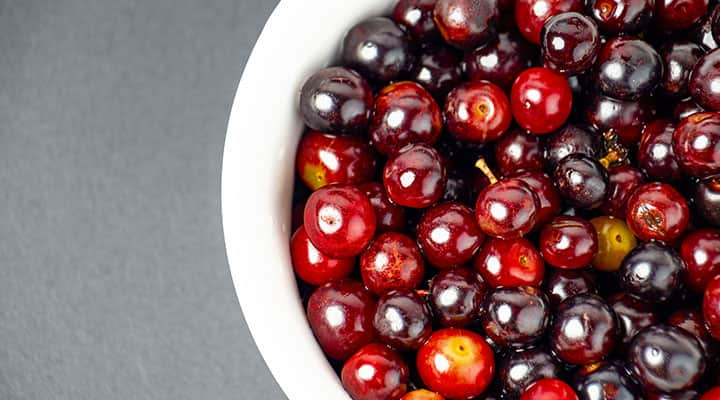
10 Melatonin Alternatives for Sleep
Published: November 2023
Our bodies are perfectly designed for waking and sleeping on Earth, which rotates every 24 hours to give us days of sunshine and nights full of stars. When it starts to get dark as the sun sets, a tiny gland in your brain called the pineal gland gets to work ramping up the production of sleep-inducing melatonin. The levels of this hormone stay low throughout the day but rise at night until drowsiness prompts you to head to bed for rest and recovery.
Sadly, natural sleep-wake regulation doesn't always go so smoothly. Artificial light, excessive screen time and everyday stress can interfere with your circadian rhythms and your ability to get restorative rest.
Because of melatonin's role in the sleep-wake cycle, melatonin supplements are often recommended as the first choice to support healthy sleep. But melatonin supplementation may not be appropriate for everyone. If you don't want to take melatonin, alternative sleep supplements may offer the support you need for healthy rest.
Why would you not want to take melatonin?
Melatonin is a naturally occurring hormone in your body that helps to regulate circadian rhythms, but some people find taking melatonin leads to drowsiness the next day. They might prefer to take melatonin for occasional jet lag but prefer an alternative to melatonin supplements for supporting daily sleep. Melatonin is also associated with vivid dreams, which may be a natural consequence of sleeping more soundly. In these cases, alternative sleep-promoting supplements may offer more restful options.
Also, those who struggle to "turn off their brain" at bedtime might find a melatonin-free supplement for healthy stress management to be a better nighttime support than melatonin.
10 best melatonin alternatives
What can you take instead of melatonin supplements to support a healthy sleep cycle? A number of nutrients may be able to help you relax at bedtime and get the good night of rest you need.
Pro tip: Look for standardized sleep supplements as you compare alternatives. Standardization ensures that supplements contain exact levels of their active ingredients.
Standardized black cumin seed oil.
Black cumin seed (Nigella sativa) and black cumin seed oil promote a number of health benefits, including sleep quality and healthy stress management. In addition, black cumin seed oil has antioxidant and immune-supporting properties, as well as the ability to help inhibit inflammation to support whole-body health. In a three-month study of 72 healthy volunteers, 79% reported better sleep satisfaction when taking black cumin supplements. Perceived stress levels among the supplement group also dropped significantly.Standardized ashwagandha.
Ashwagandha is an adaptogen that supports how your body responds to stress, and it has been used for centuries in Ayurvedic regimens. It is a popular melatonin-free option because it helps you calm your mind and drift off to sleep, which supports sleep quality in people who struggle to get restorative rest. Ashwagandha also encourages sleep efficiency, which means the ratio of sleep time to time spent in bed. (You want most of that time to be spent sleeping, not staying awake and wishing you were asleep!)Bioactive milk peptides.
Alpha-s1 casein hydrolysate, a peptide found in milk protein, helps promote perceived sleep quality and efficiency and encourages falling and staying asleep. One study showed better results after four weeks than two weeks, suggesting long-term supplementation may offer better outcomes. Bioactive milk peptides have also been shown to encourage a healthy response to stress.Standardized lemon balm.
Lemon balm (Melissa officinalis) contains properties that promote an overall sense of calm and support nervous system health. Lemon balm has been shown in research to encourage healthy stress management and healthy sleep.
Some sleep-promoting herbs are suggested to produce calming effects by inhibiting the breakdown of the neurotransmitter GABA, or gamma-aminobutyric acid. GABA works to calm your mind and keep that calm feeling going, which promotes relaxation.
Explore Our Best Sleep Supplements
L-tryptophan.
The amino acid L-tryptophan has a long history of use for sleep-related support. As a precursor to serotonin and melatonin, L-tryptophan may work as a melatonin alternative by prompting your body to produce sleep hormones. Studies suggest L-tryptophan supplements help decrease the time spent awake after initially falling asleep (wake after sleep onset) and support a healthy sleep-wake cycle.Glycine.
Glycine is an amino acid that can also act as an inhibitory neurotransmitter—a chemical messenger that calms brain activity. When taken as a sleep supplement, glycine helps support sleep quality and efficiency and promotes falling asleep, without next-day sleepiness. Also, glycine encourages mental clarity to help you focus throughout the day.Magnesium.
Known for its relaxing qualities, magnesium is a common supplement for sleep support, as magnesium-rich foods and supplements may help increase your calm factor. Supplemental magnesium has also been shown to support a healthy nervous system and whole-body health in addition to sleep health.Chamomile.
Chamomile (Matricaria chamomilla) is common in bedtime teas and other sleep remedies. Chamomile tea is brimming with beneficial antioxidants, and the warm comfort of an evening cup of tea can add to this herb's support for a relaxing and restful night's sleep. Also, chamomile extract has encouraged stress relief and healthy mood support in a variety of studies.Tart cherry.
Although tart cherry is often used to support muscle recovery after exercise, it has also been used to help promote restful sleep. A study of participants over age 50 found cherry juice increased sleep time and sleep efficiency in a placebo-controlled, randomized trial.Valerian root.
Valerian root is a popular alternative to melatonin. This herbal supplement has been used to support healthy sleep for more than 2,000 years.
Should you use sleep supplements every night?
Sleep supplements, whether they contain melatonin or not, should be safe to use if taken according to the product label. But if you often have difficulty getting restful daily sleep, you should speak with a healthcare provider. Sleep supports many aspects of physical and mental well-being, so sleep health shouldn't be taken lightly.
Other tips to help you get quality shut-eye
Melatonin and other sleep supplements may be helpful in the short term, but long-term changes may require healthier sleep habits, including:
Daily exercise
—but avoid high-intensity exercise right before bed.A nutritionally balanced diet
—although be sure you're not eating a heavy meal one to two hours before bedtime.Regular sleep/wake times
—no heavy napping during the day.Blue light limits
—which means turning off the phone and TV at least an hour before lights out.
Wondering how you can best support sleep quality, with or without melatonin? Take our health needs quiz for a recommendation tailored to you!
References
- Arab A, et al. "The Role of Magnesium in Sleep Health: a Systematic Review of Available Literature." Biol Trace Elem Res. January 2023. https://pubmed.ncbi.nlm.nih.gov/35184264/
- Cases J, et al. "Pilot trial of Melissa officinalis L. leaf extract in the treatment of volunteers suffering from mild-to-moderate anxiety disorders and sleep disturbances." Med J Nutrition Metab. December 2010. https://www.ncbi.nlm.nih.gov/pmc/articles/PMC3230760/
- Deshpande A, et al. "A randomized, double blind, placebo controlled study to evaluate the effects of ashwagandha (Withania somnifera) extract on sleep quality in healthy adults." Sleep Med. August 2020. https://pubmed.ncbi.nlm.nih.gov/32540634/
- Friedman M. "Analysis, Nutrition, and Health Benefits of Tryptophan." Int J Tryptophan Res. September 2018. https://www.ncbi.nlm.nih.gov/pmc/articles/PMC6158605/
- Hieu TH, et al. "Therapeutic efficacy and safety of chamomile for state anxiety, generalized anxiety disorder, insomnia, and sleep quality: A systematic review and meta-analysis of randomized trials and quasi-randomized trials." Phytother Res. June 2019. https://pubmed.ncbi.nlm.nih.gov/31006899/
- Kim HJ, et al. "A Double-Blind, Randomized, Placebo-Controlled Crossover Clinical Study of the Effects of Alpha-s1 Casein Hydrolysate on Sleep Disturbance." Nutrients. July 2019. https://www.ncbi.nlm.nih.gov/pmc/articles/PMC6682925/
- Losso JN, et al. "Pilot Study of Tart Cherry Juice for the Treatment of Insomnia and Investigation of Mechanisms." Am J Ther. March 2018. https://www.ncbi.nlm.nih.gov/pmc/articles/PMC5617749/
- Mohan ME, et al. "A proprietary black cumin oil extract (Nigella sativa) (BlaQmax®) modulates stress-sleep-immunity axis safely: Randomized double-blind placebo-controlled study." Front Nutr. April 2023. https://www.ncbi.nlm.nih.gov/pmc/articles/PMC10149792/
- Savage RA, et al. "Melatonin." StatPearls. August 2022. https://www.ncbi.nlm.nih.gov/books/NBK534823/
- Shinjyo N, et al. "Valerian Root in Treating Sleep Problems and Associated Disorders—A Systematic Review and Meta-Analysis." J Evid Based Integr Med. October 2020. https://www.ncbi.nlm.nih.gov/pmc/articles/PMC7585905/
- Yamadera W, et al. "Glycine ingestion improves subjective sleep quality in human volunteers, correlating with polysomnographic changes." Sleep Biol. Rhythms. March 2007. https://onlinelibrary.wiley.com/doi/full/10.1111/j.1479-8425.2007.00262.x
- "Valerian." Mount Sinai. https://www.mountsinai.org/health-library/herb/valerian/
Like what you read?
Please subscribe to get email updates on this blog.









